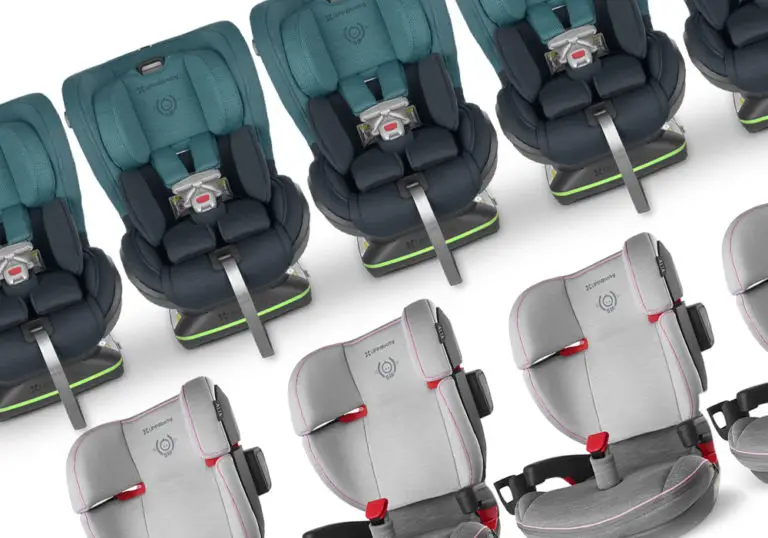Massachusetts Car Seat Laws 2024 (Rear, Forward & Booster)

Massachusetts car seat laws require a child passenger under 8 years of age or shorter than 57 inches (4’9”) in height to be secured in a child safety restraint system. They are exempt if they are physically unable to use the child restraint and have a statement from a licensed physician to that effect. Violating the law carries a penalty.
Disclaimer: The content in this article does not, in any manner, constitute legal advice. It is solely for the purpose of providing information. The law is amended from time to time and information in this article may not always be up to date. We recommend you check the original source of the law.
- MA Rear-Facing Seat Law
- MA Forward-Facing Seat Law
- MA Booster Seat Law
- MA Child Front Seat Law
- MA Child Seat Belt Law
- MA Taxi Child Seat Law
- MA Ridesharing Seat Law
- MA Child Seat Repl. Law
- Leaving Child in Car in MA
- Choosing a Child Seat in MA
- Seat Installation Help in MA
Massachusetts Car Seat Laws
Massachusetts Rear-Facing Car Seat Law
There is no express rear-facing car seat law in Massachusetts. The law simply states that children younger than 8 years or shorter than 57 inches must be placed in an appropriate child restraint. (1) A school bus and a vehicle manufactured before July 1, 1966, are exempt from this rule. Children who cannot physically be secured in a car seat are also exempt.
Since there is no Massachusetts rear-facing child seat law, it is best to follow the guidelines of the American Academy of Pediatrics (AAP). An infant must be placed in a rear-facing car seat in the backseat. The rear-facing car seat age in Massachusetts is absent. The state’s official website suggests that children ride rear-facing at least till the age of 2. (2)
There is a maximum penalty of $25 for disobeying the law.
Age: Recommended- Newborn to 2 years
Height: Shorter than 57 inches
Penalty: $25
Massachusetts Forward-Facing Car Seat Law
There is no forward-facing car seat law in Massachusetts. Under the Massachusetts car seat regulations, children younger than 8 years or shorter than 57 inches must be secured in an appropriate child safety seat. (1) The State’s official website recommends keeping your child in a rear-facing seat till they outgrow its upper height or weight limits. (2)
Since there is no formal Massachusetts forward-facing child seat law, the forward-facing car seat age in Massachusetts is also absent. But a child should remain in a forward-facing seat with a harness and tether till they outgrow the limits prescribed by the manufacturer. This may occur between 2 to 7 years of age. The National Highway Traffic Safety Administration (NHTSA) also recommends the same.
Violating the law carries a maximum penalty of $25.
Age: Less than 8 years
Height: Shorter than 57 inches
Penalty: $25
Massachusetts Booster Seat Law
According to the child booster seat law in Massachusetts, a child less than 8 years of age or shorter than 57 inches should ride in a federally-approved booster seat. (1) The seat must be installed as per the manufacturer’s instructions.
The booster seat age in Massachusetts is not prescribed explicitly. But once a child passes the upper height and weight limits of a forward-facing seat, they can start riding in a booster seat with a lap and shoulder belt. As per Massachusetts booster seat requirements, they should remain in the booster till they are big enough to fit in a seat belt properly. (2)
You can either choose a high-back or backless booster seat, depending on your requirements. Violating the child seat requirements in Massachusetts entails a penalty of $25.
Age: Less than 8 years
Height: 57 inches or shorter
Penalty: $25
Massachusetts Child Front Seat Law
There is no specific child front seat law in Massachusetts. But the State recommends keeping children in the backseat till they are 13 years old since it is safer. (2) The AAP also recommends the same. So even though the front seat age in Massachusetts is absent, it is best to follow the State’s and AAP recommendations.
If it is absolutely necessary, a child can ride in the front seat in a forward-facing seat. In the case of a rear-facing seat, the passenger-side airbag must be deactivated. The child’s car seat must be appropriate for their height and weight. The vehicle seat must be pushed as far back from the airbag as possible.
You must follow these requirements to ensure the complete safety of your child in the front seat.
Age: Recommended- 13+ years
Massachusetts Child Seat Belt Law
According to the child seat belt law in Massachusetts, all children under 13 years old who are taller than 57 inches must wear a seatbelt. (1) It must fit snugly across their lap and shoulders. They have to wear it in the backseat as well as the front seat.
The requirements of Massachusetts children’s seat belt law do not apply to a child riding in a school bus or in a vehicle manufactured before July 1, 1966, that doesn’t have seatbelts. A child who is physically unable to use an adult safety belt is also exempt. They have to carry a written certification from a licensed physician stating the same.
The driver is responsible for obeying the seat belt rules in Massachusetts. Not wearing a seat belt carries a fine of $25.
Age: 8 to 13 years
Height: Taller than 57 inches
Penalty: $25
Massachusetts Taxi Child Seat Law
According to the taxi child seat law in Massachusetts, taxis are not required to have a child passenger safety system in place. (1) The driver is not responsible for providing a car seat. Massachusetts state law does not place any liability on the driver of the taxicab.
However, as parents and caregivers, it is best if you arrange an appropriate taxi child seat in Massachusetts. Depending on your child’s age, height and weight, you can select a rear-facing, forward-facing, or booster car seat. These car seats will provide adequate protection to your child.
When installing the car seat in a taxi, it is your responsibility as a caregiver to ensure that it is securely fixed. You can refer to the car seat manual for proper installation.
Massachusetts Ridesharing Child Seat Law
There is no clear ridesharing child seat law in Massachusetts. As per the car seat laws in Massachusetts, a child younger than 8 years or shorter than 57 inches has to be secured in an appropriate child restraint. (1) The driver will be responsible for any violation.
In the absence of a clear provision, it is best for either the driver or the parents/caregivers to provide a child seat. An infant should be placed in a rear-facing car seat. Young children and toddlers should ride in a forward-facing car seat.
Once they outgrow it, they should ride in a booster seat till they are big enough for the safety belt to fit them properly. Thus, before booking a rideshare service such as an Uber or Lyft, check if the driver has a car seat or arrange one.
Massachusetts Child Seat Replacement Law
There is no definite child seat replacement law in Massachusetts. But the State government recommends checking the expiration date of the car seat. (2) It should not be used beyond the date prescribed by the manufacturer.
The NHTSA recommends replacing a child safety seat after an accident in Massachusetts. In case of a moderate or severe crash, you should immediately replace the seat. But if it is a low-impact accident, there is no urgent need to replace the car seat.
A low-impact crash is where no passenger is injured, the door nearest to the car seat is not damaged, and the seat itself shows no visible damage.
Apart from child seat replacement after an accident, you must also replace it after it has expired or been recalled.
Leaving Child in The Car in Massachusetts
According to the law on leaving a child in a vehicle in Massachusetts, daycare providers must ensure that a child is not left alone in a vehicle at any time. (3) This law only applies to licensed daycare providers. However, leaving a child unattended in a vehicle is extremely dangerous.
The most common danger is heat stroke. The temperature inside the vehicle can rise rapidly. Since children’s bodies heat up faster than adults, they are at great risk of suffering a heat stroke. Other risks include setting the car in motion, getting strangled by seat belts or power windows, or having some other in-car accident.
In the absence of any specific law for all drivers, authorities can charge caregivers under child endangerment laws for leaving a child in the car in Massachusetts.
Choosing a Child Car Seat in Massachusetts
Massachusetts child seat laws give you the flexibility to choose an appropriate car seat for your child. When choosing a car seat in Massachusetts, you should follow the pointers given by the Massachusetts government. (2)
From the time your child is born till they turn at least 2 years old, a rear-facing car seat is the best car seat to use in Massachusetts. They can then move to a forward-facing seat with a harness and teether.
After they reach the maximum height and weight limits of the forward-facing seat, they should use booster seats. A high-back or backless seat is the best booster seat to use in Massachusetts.
Car Seat Installation Help in Massachusetts
Installing a car seat can be a tedious task, especially if you are doing it for the first time. The seat must be secured perfectly as per the manufacturer’s instructions to ensure the safety of your child.
To help you with installing child passenger safety seats in Massachusetts, the state has different stations with certified Child Passenger Safety (CPS) technicians. You can get your car seat checked or installed and also learn more about child passenger safety. Some of the stations where you can get assistance are:
- The Massachusetts State Police
- Norwell Police Department
- Boston EMS
- Concord Police Department
- Stoneham Police Department
- Harvard University Police Department
- Brookline Police Department
Massachusetts Car Seat Safety Resources
- Car Seat Safety- Massachusetts Government
- Network of Care Massachusetts: An online repository that helps people find resources in their community.
- Boston Children’s Hospital: A leading pediatric hospital, it is involved in clinical care, research, and community engagement.
- Safe Kids Massachusetts: Led by Boston Children’s Hospital, it conducts programs on car seat safety and installation for parents/caregivers.
- The Town of Concord, Massachusetts: The official website of the town of Concord. It provides information on car seats as well as installation points.
- City of Gloucester: The official website of Gloucester, it provides recommendations as well as resources on car seat safety.
FAQ
How long should a child ride in a rear-facing car seat in Massachusetts?
The law does not expressly state an age. But the State recommends that children ride in a rear-facing car seat till the age of 2 years.
Can you put a rear-facing car seat in the front seat in Massachusetts?
The law is silent. However, a rear-facing car seat should be placed in the back. If you do put it in front, the front seat airbag must be deactivated.
Can you put a rear-facing car seat in the middle rear seat in Massachusetts?
You can put a rear-facing car seat in the middle rear seat if your vehicle has lower anchors in the middle. Check your vehicle and car seat manuals.
When can a baby face forward in a car seat in Massachusetts?
A baby can face forward after they have outgrown the limits of their rear-facing seat. This typically happens around 2 years of age but may take longer.
How old for a booster seat in Massachusetts?
Children younger than 8 years and shorter than 57 inches should ride in a booster seat. They should transition to a booster once they outgrow their forward-facing seat.
When to use a backless booster seat in Massachusetts?
You can use a backless booster seat if your vehicle seat has a headrest and the child’s ears are not higher than the seat back.
When can a child sit in the front seat with a booster in Massachusetts?
Children should ideally ride in the backseat. But if it is unavoidable, they can ride in the front seat with a booster with the seat pushed back.
When can a child stop using a booster seat in Massachusetts?
A child can stop using a booster seat when they turn 8 years old or reach 57” in height, whichever occurs first. They can then start using the seatbelt.
When can a child sit in the front seat in Massachusetts?
Children should ride in the backseat as it is safer there. They can sit in the front seat after they reach the age of 13 years.
When to switch from 5 point harness to a seat belt in Massachusetts?
When the child outgrows the height and weight limits of the 5-point harness, they can switch to wearing a seat belt in a booster seat.
When can a child use a regular seat belt in Massachusetts?
Under the law, a child can start using a regular seat belt once they are 8 years old or stand at least 57” tall (regardless of age).
Do you need a car seat in a taxi in Massachusetts?
Taxis are not required to have a car seat. However, it is recommended that you carry an appropriate car seat for maximum protection of your child.
Do you need a car seat in a Uber in Massachusetts?
The law is unclear on this subject. But either the parent/caregiver or the driver should provide a federally approved and appropriate car seat for the child.
Do you need a car seat in a Lyft in Massachusetts?
The law is not clear on this issue. But either the caregiver or the driver should provide an appropriate car seat to ensure the child’s safety.

Rishima Rawat
Rishima Rawat is a lawyer and legal writer with over six years of writing and legal experience. She earned her LLB degree from the West Bengal National University of Juridical Sciences, Kolkata. With a passion for child safety, she’s written extensively about the U.S. car seat laws in ParentingMode. She collaborates with businesses and law firms globally, enhancing their online content. Her insights are also published in legal journals like RGNUL, NLIU, and RMLNLU Law Review. Committed to the cause of education, she has volunteered with IDIA, which helps underprivileged children in India to access legal education. She has also worked with Enhelion Knowledge Ventures, a leading legal ed-tech platform in India that provides students with affordable courses in law. Fluent in English and Hindi with elementary proficiency in Spanish, Rishima combines her legal expertise with a dedication to child safety.






